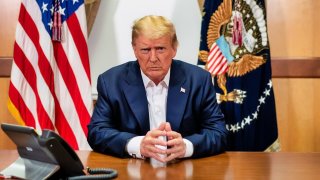The Meaning of 'America First' Foreign Policy
The America First platform should unapologetically make the case for America’s true interests and design US foreign policy to defend them in power. The United States of America exists to protect the natural rights and prosperity of the American people. It is not an institution of international security and it endangers itself by behaving like one.
America First should aim to construct a sustainable balance of power in Asia. The vertiginous growth of Chinese military power must be met with an energetic, near and long-term reinforcement of America’s regional security system. The US needs a bigger navy—especially more submarines—and heavy investment in a resilient, denial-oriented network of long-range systems. America First assesses the value of alliances on the basis of whether they contribute more to solving specific American security goals than they incur in cost and risk. Frontline allies underspending on defense or pursuing destabilizing policies will not be considered to be in good standing. In particular, Japan—the keystone of America’s position in Asia—must expand its overdue defense buildup program and take steps to harden its bases. Making the US-China balance sustainable requires modulating the action-reaction dynamic of US-China relations: actions the US takes to secure its position drive countervailing Chinese moves, and vice versa. Conservatives, by their ideological emphasis on good judgement and wariness of unintended consequences, should work toward a structure of reciprocal restraints—including arms control—to stabilize the overlap between America’s sphere of influence and China’s. Peace through strength, yes, but also through prudence.
The US should not stake its Asia policy on the volatile Taiwan question. The current ambiguous US policy towards Taiwan reconciles two interests (in Taiwan’s democratic autonomy and in avoiding general war), the collision of which would conjure a perfect storm for US foreign policy. President Trump is right that the US should maintain this formula for the foreseeable future. Its deterrent features should be enhanced. But putting America First requires admitting that the US interest in avoiding a superpower conflict in Asia greatly outweighs its interest in the fate of Taiwan. In the final analysis, Taiwan is not worth American blood.
The greatest danger for US policy in Asia is that it follows the imperatives of deterrence and emergency thinking into a war over non-vital stakes which deals irreparable damage to our Indo-Pacific security system. Authoritative wargames estimate US engagement in a conflict over Taiwan could lead to the loss of dozens of our warships, hundreds of our aircraft, and thousands of our soldiers. It could lead to strikes on the US itself and it would put severe, possibly fatal, strain on the US-Japan alliance. The US can sustain a tolerable balance of power in Asia without Taiwan, but not without Japan. The loss of that alliance would entail a sudden contraction of our Asian security perimeter, impinging directly on the safety of Hawaii, Alaska, and the West Coast states. It should not be gambled on the Taiwan question. It follows that cross-strait deterrence measures should be carefully calibrated so as not to raise the risk of crises and conflict. And US policymakers should avoid entangling the US-Japan alliance too deeply in the issue.
A world of geopolitical stalemate requires diplomatic flexibility, not deterrence über alles. The GOP has a proud tradition going back to Theodore Roosevelt of doing deals with geopolitical rivals. America First should continue it. The diffusion of economic and military power away from the US means America’s resort to the sword carries greater direct and indirect costs than it did 20 years ago. But US foreign policy is usually confined to an inflexible mix of deterrence, sanctions, and righteous indignation. The stalemates we face in Ukraine, Taiwan, the Korean Peninsula, and the Western Pacific are rooted in politics. They are also shaded by varying degrees of nuclear risk, which takes military endgames off the table. It is in the interests of the American people to stabilize and attempt to resolve them. The only way to do that is through diplomacy and imaginative reconciliation of national interests. America First aims to restore the US capacity to do deals on first-order questions such as geopolitical alignment, neutrality, and nuclear and conventional arms control. The alternative is a recipe for periodic war scares and crises, each of which is a roll of the dice.
The Bottomline
America First is a policy of sufficiency over luxury and true national interests over imperial conceit. It is a conservative approach designed to protect the republic in a complex world. US presidents used to pursue these interests as second nature: defend our sovereignty; defend the Monroe Doctrine; avoid foreign wars unless absolutely necessary; manage great power relations with confidence and reciprocity; and expand the frontiers of human achievement. Over the last 80 years we have replaced these with a set of global, imperial interests essentially alien to the real security requirements of the American people. The America First platform should unapologetically make the case for America’s true interests and design US foreign policy to defend them in power. The United States of America exists to protect the natural rights and prosperity of the American people. It is not an institution of international security and it endangers itself by behaving like one.
About the Author
Evan Sankey is a Senior Research Associate and Manager at the Belfer Center for Science and International Affairs at the Harvard Kennedy School.


